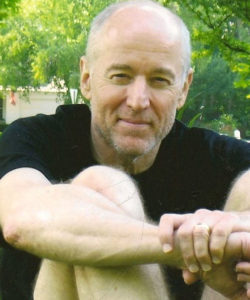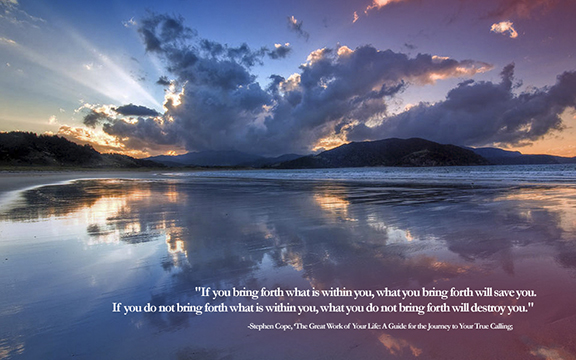Fifteen years ago, I was happily retired, largely unacquainted with Yoga, when I happened upon a book by Stephen Cope called Yoga and the Quest for the True Self. I knew right away that my life would never be the same. The book instantly and utterly transformed me. The philosophy was that powerful and the writing that personal and engaging. I started reading every book on Yoga philosophy I could get my hands on.
I started trying to describe what was happening inside of me, just for myself at first, in what would later become Yoga Demystified: The Six Big Ideas. I started blogging and writing poems and articles. Then I ran into Elephant Journal and started a series of discussions about the Bhagavad Gita that would culminate in Bhagavad Gita in a Nutshell. I became the Yoga Editor for Elephant.
I’m quite sure that none of this would have happened except for Stephen Cope and the powerful personal influence of Yoga and the Quest for the True Self. You might think this kind of epiphany would be a one-time event. I did. Late 2010, I had the good fortune to be invited by the Kripalu Center to interview Stephen Cope about his then new book, called The Great Work of Your Life: A Guide for the Journey to Your True Calling. Guess what? It’s all about the Bhagavad Gita and how it is reflected in the lives of eleven famous people in history. And then it happened again. This book has transformed my life just like Yoga and the Quest for the True Self did seven years before his latest book. I’ll leave the details of that story for another day, but for now let me just say that, if you have any interest in Yoga philosophy or the Bhagavad Gita—heck, even if you have absolutely no interest in either, but are just looking for some soaring inspiration for your daily life, you’re going to want read this book.
What makes Stephen’s books so very special is the way he mixes great spiritual truths, insights for everyday life, and his own personal story—how this all affected his own life and that of his friends. When you read Stephen Cope, you feel like you’ve spent all those hours hanging out with the author himself, rather than reading a book. I had vivid conversations in my head with Stephen for seven years before I actually met him. When I finally sat with him in his office at Kripalu in 2011 for a couple of hours, well, it was pretty much the same as it was in my head all those years. That’s how engaging, personal, and exquisitely crafted his writing is.
Some of the 11 famous people in this book are obvious (at least to those already familiar with the story of the Yoga philosophy’s influence on American spiritual history. Walt Whitman is there, whose “Song of Myself” is often referred to as the “American Bhagavad Gita.” So is Mohandas Gandhi, for whom the Gita was his motivational and practical bible. And Henry David Thoreau, who famously chose the Bhagavad Gita as one of the five books he took with him to Walden Pond. But Ludwig van Beethoven? Who knew that Beethoven had quotes from the ancient Yoga texts for daily inspiration underneath the glass on his desk? Who knew that his struggle to endure and eventually triumph over the unbearable tragedies in his life, like being abused by his father, suicidal depression, and going deaf, exemplify the philosophy of the Bhagavad Gita? Or Robert Frost? Or Susan B. Anthony? Or Camille Corot (the impressionist painter most admired by other impressionist painters)? Or Harriet Tubman? Or John Keats? Or Marion Woodman? Or Jane Goodall?
When I talked to Stephen at Kripalu, where he was the director of the Kripalu Institute for Extraordinary Living, he told me he had many more stories to tell like these. His research turned up many more people than these eleven who lives have either been heavily influenced by the Bhagavad Gita, or whose lives exemplify its principles. He said he had trouble choosing which ones to include. Sounds like a sequel to me. What could be better for a Gita lover like myself, already gaga over Cope’s writing, and whose life has already been twice transformed by his books. Put this one on your “must-read” list.
 Bob Weisenberg is the former Yoga Editor and Associate Publisher for Elephant Journal (2009 to 2012), and the author of a new ebook of his writing from that era, Each Moment is Like a Precious Diamond. In addition, Bob is a retired software entrepreneur, a flamenco guitarist, and, in his retirement, an avid traveler. Between 2014 and 2020, Bob and his wife Jane lived all over the world 1-3 months at a time, the majority of time house sitting (pet sitting, really, for many beloved creatures). For more, and to download his new book, see his website. (Reprinted from Elephant Journal)
Bob Weisenberg is the former Yoga Editor and Associate Publisher for Elephant Journal (2009 to 2012), and the author of a new ebook of his writing from that era, Each Moment is Like a Precious Diamond. In addition, Bob is a retired software entrepreneur, a flamenco guitarist, and, in his retirement, an avid traveler. Between 2014 and 2020, Bob and his wife Jane lived all over the world 1-3 months at a time, the majority of time house sitting (pet sitting, really, for many beloved creatures). For more, and to download his new book, see his website. (Reprinted from Elephant Journal)

 Stephen Cope changed my life. He might change yours, too. Need inspiration today? You got it. Put away your yellow highlighter when you read a
Stephen Cope changed my life. He might change yours, too. Need inspiration today? You got it. Put away your yellow highlighter when you read a 